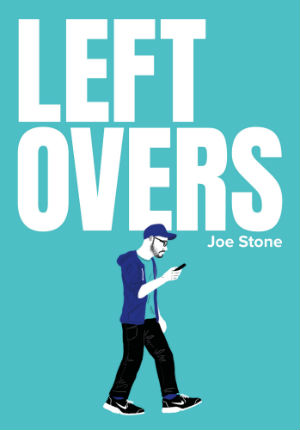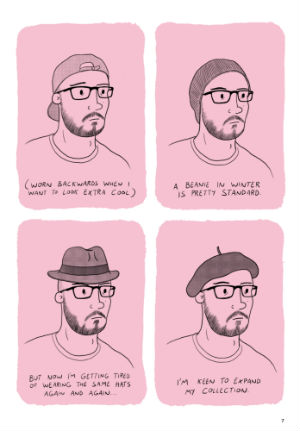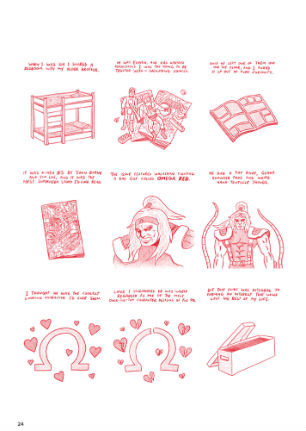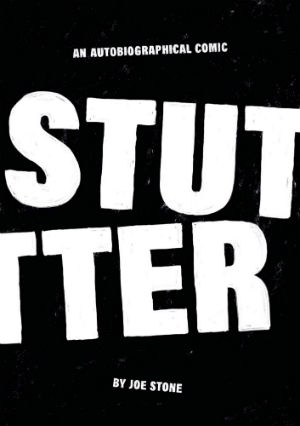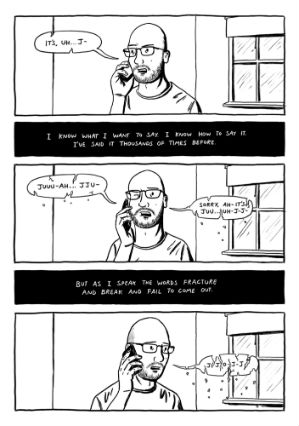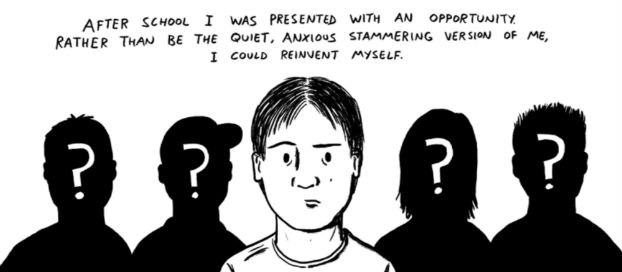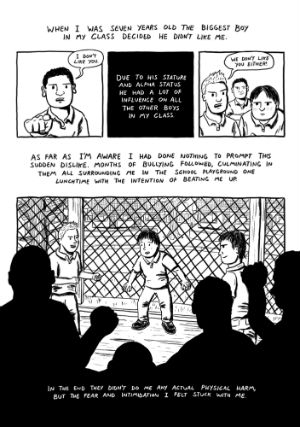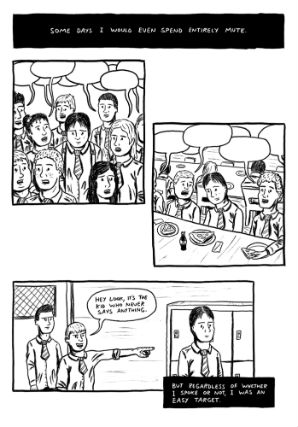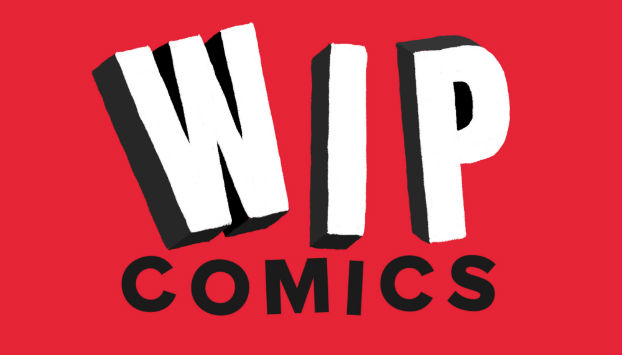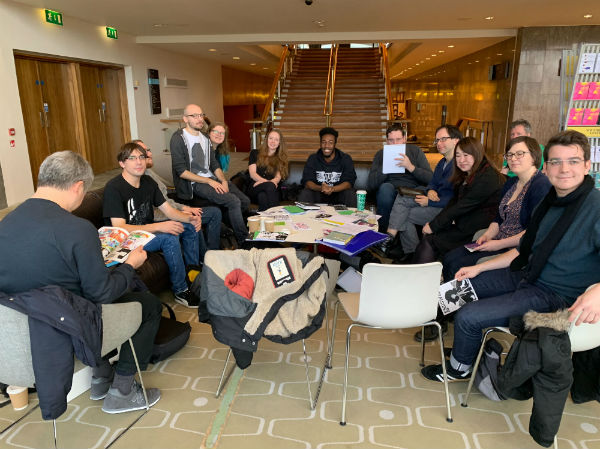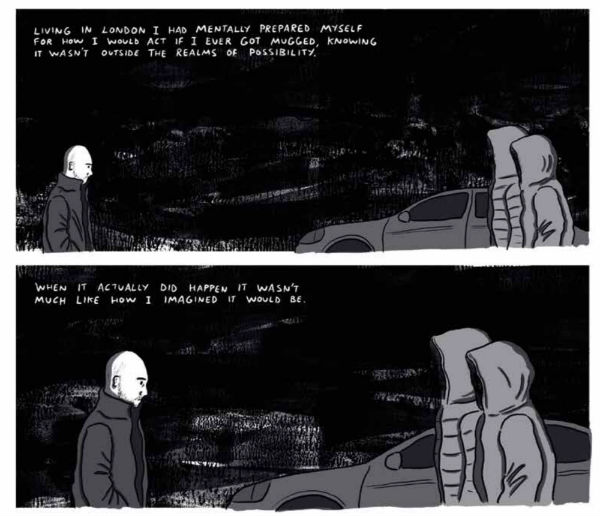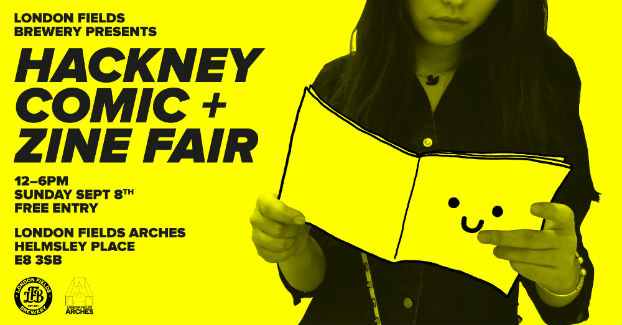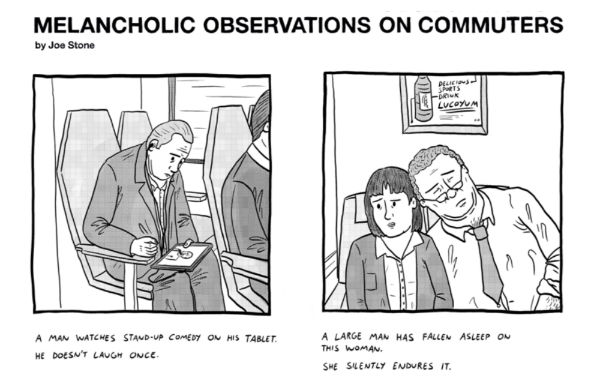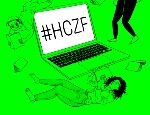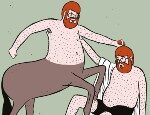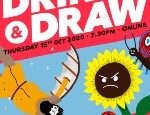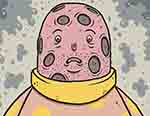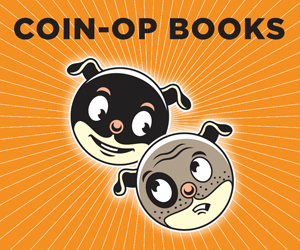ELCAF FORTNIGHT!
Joe Stone is a man of many hats. We know this because one of his minicomics was about just that subject. He’s the self-publishing comics creator behind last year’s critical hit Stutter which looked back on his experiences growing up and living with a speech impediment. He’s also the co-ordinator of the supportive London group for aspiring comics artists WIP Comics (Work in Progress Comics). Added to that he’s the man behind this September’s new small press fair Hackney Comic and Zine Fair. And, of course, he’s a 2019 Broken Frontier ‘Six Small Press Creators to Watch‘ artist.
Ahead of Joe’s appearance at this weekend’s ELCAF I chatted with him about falling in love with the form as a child, the role of WIP Comics in boosting new creators and the challenges of autobiographical comics…
ANDY OLIVER: You’ve spoken to us in the past about being obsessed with comics since you were 6-years-old. What was it about the form that so immediately grabbed you as a child?
JOE STONE: It all began with finding a copy of the 1990s X-Men #5 on the floor of the bedroom I shared with my brother when I was six. My brother is six years older than me and generally liked to keep all of his stuff out of my hands, mostly for it’s own safety (I had a habit of accidentally breaking a lot of his toys), so part of my interest in it was that I wasn’t supposed to be reading it. When I did pick it up I just got sucked in to it all – the colours, the action, the crazy character designs. It was around this time that the X-Men cartoon was on TV as well, so those two things coupled together led me to have this huge fascination with superheroes and comics from a very young age.
I’d also been drawing since I was very young as well, and was always encouraged to do so by my parents (possibly because it kept me busy so I couldn’t go around breaking my brother’s toys). The vivid world that existed in those superhero comics just seemed like so much fun, and so much more exciting than any other picture books I’d seen before, so I liked the idea that I could do something like that. I started drawing my own comics very young too, even getting given a shout out in a school wide assembly when I was about 10 for doing them by a teacher who was leaving.
As I got older I discovered more and more different genres and styles, and saw the huge wealth of material that was out there for me to consume, and it’s just always been an interest of mine and I imagine it will be for the rest of my life.
AO: Can you elaborate on your very memorable description of your work as “contemporary observational comedy with a heavy dose of melancholy”?
STONE: There is so much that can be extrapolated from even the tiniest interactions if you observe them in the right way. I like the idea of breaking down a single moment or experience – whether that be someone waiting for a reply to a text message, or a commuter looking out of a train window – and seeing how much narrative can be extracted from it. This is where I like to try to find or inject some humour, especially in the most mundane of actions, but I’ve found more often than not there is also a much more tragic layer to it all if you look close enough. Comics are the perfect medium for this sort of storytelling too, as they allow you to do so much interesting stuff that can skew the perspective of the reader or show multiple points of view.
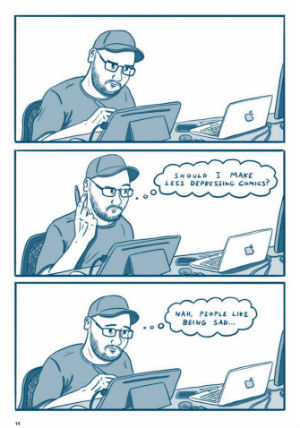 People’s reactions to my work tend to vary wildly on the funny/melancholic scale too. I’ve seen people read one comic and immediately start laughing, and then have someone else look at the exact same comic and glumly tell me how sad it is. I guess it depends on your outlook on life and willingness to laugh at ourselves as a society. My proudest achievements in comics are when I manage to do something that is both funny and sad at the same time, and the reader can get a little of each emotion.
People’s reactions to my work tend to vary wildly on the funny/melancholic scale too. I’ve seen people read one comic and immediately start laughing, and then have someone else look at the exact same comic and glumly tell me how sad it is. I guess it depends on your outlook on life and willingness to laugh at ourselves as a society. My proudest achievements in comics are when I manage to do something that is both funny and sad at the same time, and the reader can get a little of each emotion.
On a wildly anecdotal sidenote, one of my favourite such reactions came at Thought Bubble last year when a group of goths came to my table and one of them picked up a mini-comic I’d made about a missing cat. After flicking through a few pages she put it down, saying it was too depressing. My comics are officially too depressing for goths…
AO: Your comic Stutter was published to huge critical acclaim last year getting notable social media pushes from big names in the wider comics world like Marvel writer Donny Cates. For those about to discover the comic for the very first time what’s the basic premise of the story?
STONE: Stutter is my autobiographical comic about what it’s like having a speech impediment, charting the course of its impact on my life from when I first developed it as a child right up to the current day and how it still affects me now as an adult. I tried approach it as matter-of-factly as I could, and was really conscious to not let it turn into a navel-gazing, woe-is-me story, and just be as honest as possible with how it has influence the way I interact with the world.
There are little-to-no jokes in it, so it definitely veers more towards the melancholic end of my body of work.
AO: This is a standard question when it comes to comics and autobiography but was there a sense of trepidation in putting Stutter out there given its powerful but uncompromising honesty?
STONE: I don’t think I felt any trepidation in terms of putting it out there and sharing it with the public per se – I like to think I’m generally a very open person – but I definitely did feel a reluctance to progress with it on a personal level. I had the initial idea for it years ago, but it took me a long time to work up the will to actually sit down and do it, partially because I wasn’t confident enough in my artistic ability, but also because I knew it would feature many parts of my life that I had largely purposefully blocked out of my memory or never fully admitted to even myself. So, in that respect there were times when I was wary about whether I should be doing it or not. I’m glad I did though, for various reasons.
AO: What I loved about Stutter when I reviewed it was that it truly embraced the language of comics to depict your story. Was there an element of the cathartic about creating the book? Are you hoping it’s a story that will resonate and speak to others who have similar experiences?
STONE: Thank you! Once I’d got through the mixed feelings I had while actually doing it and got it finished then it was definitely a weight of my shoulders and a nice sense of catharsis to release it into the world. The reaction to it has made all the hardship of actually making it entirely worthwhile, too.
The feedback I’ve been most surprised but also most pleased by is how many people have said they’ve found things in it that they can relate to, despite not having a speech impediment themselves. There is a part in the book where after leaving school I tried to sort of re-invent myself to cover up how anxious and embarrassed I was about the way I talked, and that bit particularly seems to have resonated with a lot of people. I guess it’s a defence mechanism no matter why you’re doing it, whether it’s because of how you talk or any other aspect of your character that you aren’t entirely happy with, and I’m not the only one who has gone through it. I have had lots of people who do stutter tell me how much they liked it too, and have found things they can relate to it in. Donny Cates has a stutter in fact, so that’s how it got on his radar and he seemed to like it a lot. Ultimately I like to think it’s something that could be useful in some way to anyone who has felt out of place because of something that is entirely outside of their control – which I’m pretty sure is a much larger portion of the population than any of us realise.
The genesis of the whole idea for the book came from reading Jeffrey Brown’s autobio comics about relationships. He is so open and honest with his feelings in them, not sugar coating anything and also admitting to his own mistakes. A few years ago after a particularly bad breakup I read through all of his early books again, and even though the situation wasn’t exactly the same, there were similarities especially with my reaction to it, and the feeling of solidarity I got from reading them was hugely helpful to me at the time. That’s what I’d like to achieve with Stutter.
AO: You seem to enjoy experimenting with a wide-range of formats and subject matter in your comics. How important is it to you as an emerging name to be constantly exploring the boundaries of the form?
STONE: This is actually a situation I’ve always found myself in, no matter what I’m working on. Outside of comics I’m a freelancer graphic designer and illustrator, and outside of my paid work I also do dumb illustration, typography and motion projects just for my personal amusement, and with all of them I’ve always struggled with sticking to one particular style or approach.
I very much see it as a double-edged sword. On one hand, lacking a distinct style means it’s less likely that anyone will look at my work and go, ‘oh, that’s definitely a Joe Stone comic.’ But the other point of view is that my versatility is a strength, meaning I won’t get pigeon-holed and have anyone saying, ‘oh great, another samey Joe Stone comic.’
I do think that comics have a great many boundaries to explore, so why not poke around in them and see what you can come up with? It mostly boils down to the fact that I just like experimenting and trying different things. They are certain styles or subjects that I think I’ll always come back to, but there is just so much potential in comics and so many ways you can play with them that I’d get bored if I just did the same thing all the time.
AO: Earlier this year at Broken Frontier you wrote about the Work in Progress group (WIP Comics) that you oversee which provides a supportive environment and regular meet-ups for aspiring comickers in London. How is the group progressing since you last spoke about them at BF?
STONE: It’s going well! I feel quite bad as a lot of other comic-related commitments this year are falling on the same day as the monthly WIP sessions so I haven’t been able to be there for as many of them as I like. I still get involved whenever I can though, and keep in touch with the whole group via email and on Slack when I can’t attend.
Recently me and Lara Callaghan represented WIP at Comic Invasion Berlin, which marked the first comic fair appearance for the group (and the first international fair for me). We had a wide selection of work from various members of the group on sale, including myself and Lara, Nick Bryan, Matt Barrell, Peter Morey, Rebecca K. Jones and more, as well as our Work anthology. Also, at the previous WIP session I got everyone to draw some A7 micro-comics, which I scanned, printed and sold as packs of four randomly distributed comics in sealed envelopes labelled ‘Lucky WIP’ (yes, the pun came before the idea).
Being in Berlin meant I missed the WIP monthly in May, but the aforementioned and very talented Peter Morey and Rebecca K. Jones co-hosted it in my absence doing some drawing exercises with the group, as well as the usual group feedback bits and general chatter.
The Visual Storytelling Studies group run by Maggie Appleton also seems to be going very well and is helping lots of members come up with new story ideas and develop their work. So overall it’s progressing nicely.
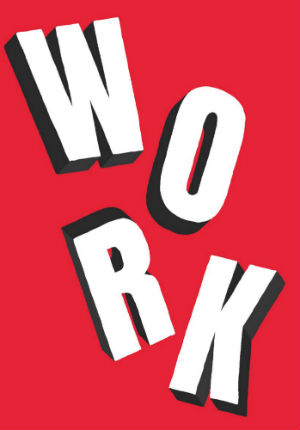 AO: Last year WIP Comics released an anthology of short stories from its members called Work. Do you have any plans for a second book in 2019?
AO: Last year WIP Comics released an anthology of short stories from its members called Work. Do you have any plans for a second book in 2019?
STONE: Yep, we’ve been talking about it and have agreed on the very appropriate theme of ‘Progress’. The plan is for it to debut at a certain little comic fair coming up in September this year. The group has been steadily growing and more people seem interested in getting involved in the second volume, and we’re also going to have some returning artists from the previous one as well, so it should be another really nice collection of comics.
I also plan to take a photo of the Work book tucked inside the Progress one for some more excellent pun-based Instagram content.
AO: What new work will you have at ELCAF this year? What can we look to pick up from you there?
STONE: For ELCAF then I’m putting some new short comics in a collection together with some older and out-of-print stuff into one nice, neat volume titled Leftovers [see selected comics pages and images throughout this interview). It will have various mini-comics that are no longer in print (yes, including that depressing one about the missing cat), a two-pager previously featured in Dirty Rotten Comics, and some other bits featured elsewhere. The new stuff includes a four-page autobiographical story that I’m very proud of, some weird single page gag comics and a few other new bits.
One of the ideas behind it is to give a sense of closure to what I consider the first phase of my comic-making career. Even though there is lots of disparate content, it’s all sort of tied together by certain themes – mostly me dealing with my own ego, trying to balance that desire to make jokes and also discuss serious issues, and a general sense of dissatisfaction with the world we live in. It veers wildly from the most light-hearted to the most serious content I’ve produced. Having all of it in one book is really nice for me, and makes me feel a bit more free to try out some new things moving forward.
It also contains a reasonably rare mini-comic that I only ever printed a handful of copies of about a praying mantis that has forgotten the words to the Lord’s Prayer. That one is somewhat less thematically tied to the rest of the content, but it is quite funny.
AO: It’s been a year when a number of familiar shows have dropped off the comics calendar but your own fair debuts to fill in one of those gaps in 2019. What can we expect from the Hackney Comic and Zine Fair this September?
STONE: You can expect a nice, informal event with two rooms full of some of the most talented people making and publishing comics in the UK, with everyone from award-winners to new emerging artists, comic-making workshops, new book debuts, lots of beer (it’s being held in a brewery, so really – LOTS of beer), the chance to chat to loads of like-minded people who also love comics, and possibly some balloons. And it’s free to get in, so there is basically no reason not to come to it.
I initially planned it as just a handful of people in a small room above a pub just to add another comic event to the calendar, but I ended up talking to London Fields Brewery who offered to sponsor the event and let me use their brilliant London Fields Arches venue, so now it’s grown in scope quite a bit! I’m a firm believer that there is no point in doing something if you’re not going to try and do it really well, so I’m putting quite a lot of effort into it but it’s very rewarding.
There will be lots more to talk about closer to the time. I’m really excited about it. More than anything I just think it will be a lot of fun.
AO: It’s obviously a very packed year for you on a number of different levels but do you have any plans for more comics later in the year, particularly around Thought Bubble in November?
STONE: I do have one project planned once I’ve wrapped up a few other things and have a bit more of a clear schedule. I don’t want to commit to having it finished in time for Thought Bubble, but would love for that to be the case. It’s going to be my longest book yet, and is firmly back in the realms of fiction rather than anything autobiographical. I don’t want to say too much about it as this stage, but it will include robots, nudity, and two glasses of wine at lunch…
Joe Stone will be exhibiting at ELCAF. You can visit his site here, his online store here and also follow him on Twitter and Instagram. Joe also has a Patreon here.
For more on ELCAF 2019 visit the festival site here and follow them on Twitter here.






